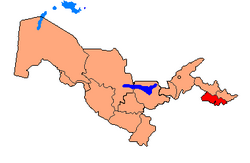Oltiariq Altyaryk | |
|---|---|
Urban-type settlement | |
| Coordinates: 40°23′30″N71°28′36″E / 40.39167°N 71.47667°E | |
| Country | |
| Region | Fergana Region |
| District | Oltiariq District |
| Urban-type settlement status | 1980 |
| Elevation | 520 m (1,710 ft) |
| Population (2011) [1] | |
• Total | 25,543 |
| Time zone | UTC+5 (UZT) |
Oltiariq (Uzbek : Oltiariq) is an urban-type settlement in Fergana Region, Uzbekistan. It is the administrative center of Oltiariq District. [2]

